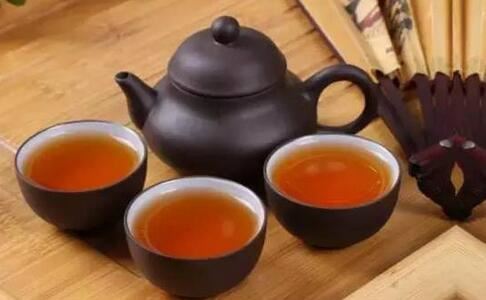160 countries and regions, 3 billion people love tea
Currently, nearly 3 billion people across 160 countries and regions enjoy Drinking Tea. This means that three out of every four countries have a tea-drinking culture, and among every five people you meet, two are likely to be tea drinkers.

China produces 1.98 million tons of tea annually, with an average per capita consumption of 566g
In 2014, China produced a total of 1.98 million tons of tea, making it the world's largest tea-producing country, accounting for 39.4% of global production. However, according to statistics from the Quartz website, the average per capita tea consumption in China is 566 grams, which is five times less than the top-ranked Turkey (3,157 grams), placing China at only the 19th position globally.
The average per capita tea consumption in Guangdong is 1,000g, while in the Pearl River Delta region, it is as high as 2,000g
Professor Huang Yahui, head of the Department of Tea Science at South China Agricultural University and doctoral supervisor, introduced that Guangdong is China's largest tea consumption market, with an average per capita consumption of 1,000 grams. In the Pearl River Delta region, annual per capita consumption reaches 2,000 grams, the highest in the country, surpassing the per capita consumption in the UK and ranking third globally.
3,000 years of tea history overshadowed by a British brand that doesn't even produce tea
China is the birthplace of tea, with a tradition of Tea drinking dating back 3,000 years to the Xia, Shang, and Zhou dynasties. However, today's largest tea brand is based in the United Kingdom, a country that does not produce a single leaf of tea. As a mere distributor of tea, this British national brand has an annual turnover of 23 billion RMB, almost equivalent to 76% of the entire Chinese Tea industry's (70,000 tea factories) annual output value.
The high price of premium tea comes from the 60,000 to 80,000 buds needed for one pound of bud tea
One pound of high-quality bud tea contains 60,000 to 80,000 buds, all hand-picked by tea pickers. This is the reason why premium tea prices are so high.

Tea longevity: The secret to centenarians' long life
In studies of centenarians, it was found that 40% attributed their longevity to a lifelong love of tea, and 80% had a habit of drinking tea. This phenomenon has been referred to as “tea longevity” by longevity research institutions.
Antioxidant properties: One cup of tea equals 12 bottles of white wine
Antioxidant tests have confirmed that one 300ml cup of tea has the same antioxidant capacity as one and a half bottles of red wine, 12 bottles of white wine, 12 glasses of beer, four apples, five onions, or seven cups of fresh orange juice. The more tea you drink, the more beautiful you become!
Anti-aging: 18 times stronger than vitamin E
Japanese scientific research has confirmed that the anti-aging effects of tea polyphenols are 18 times stronger than those of vitamin E. Tea not only promotes longevity but also slows down the aging process.
Weight loss: Lose about 3 pounds by drinking 8-10 grams of tea daily
Without any need for dieting or exercise, drinking 8-10 grams of tea daily can result in a weight loss of approximately 3 pounds over 12 weeks due to the inherent effects of the tea itself.
Boosts immunity
The Chinese Academy of Agricultural Sciences' Tea Research Institute conducted thousands of experiments on mice regarding immunity, cancer, alcohol poisoning, weight loss, cholesterol levels, and mating, among others. These experiments demonstrated that the life signs of mice given tea water or injected with tea extracts were significantly better than those of ordinary mice. Babies who drink tea get sick less often, giving mothers peace of mind.

As enjoyable as falling in love
The amino acids in tea promote the secretion of dopamine, the chemical responsible for feelings of love. Drinking tea is as delightful as being in love.
The Hiroshima phenomenon: Avoiding nuclear radiation and cancer
In August 1945, the atomic bomb dropped on Hiroshima resulted in the deaths of over 100,000 people and exposed tens of thousands more to radiation. Many of the survivors later developed leukemia or other types of cancer and died. However, researchers discovered that three groups of people remained unharmed: tea farmers, tea merchants, and tea enthusiasts. This phenomenon became known as the “Hiroshima phenomenon.”
Drinking tea reduces the risk of cancer for the Japanese population
In 1999, the Japanese government launched a two-phase plan called “Drinking Tea to Prevent Cancer in the General Population,” which involved tracking 8,522 individuals over ten years, including 419 cancer patients. Women who drank tea regularly developed cancer seven years later than those who did not drink tea, while the delay for men was 3.2 years.
Regular Green Tea drinking reduces the risk of developing cancer by over 60%
Data from studies conducted by the National Cancer Center of Japan, Case Western Reserve University in the U.S., and Curtin University in Australia on “Green Tea and Prostate Cancer” showed that regular green tea drinkers had a 60% lower risk of developing prostate cancer compared to non-drinkers.
EGCG is virtually the nemesis of all cancers
Over 4,000 authoritative papers on “Tea and Cancer” have shown that epigallocatechin gallate (EGCG), a major component of tea polyphenols, is virtually the nemesis of all cancers, particularly effective against uterine, skin, lung, colon, prostate, liver, kidney, and breast cancers. Additionally, research has found that drinking tea alongside cancer medications enhances the effectiveness of the drugs.
Drinking two cups of tea daily reduces the risk of ovarian cancer by 46%
Researchers at the Karolinska Institute in Sweden analyzed data from 61,057 women aged 40 to 76 (including 301 diagnosed with ovarian cancer). Compared to women who did not drink tea or rarely drank it, those who drank less than one cup of tea per day had an 18% lower risk of ovarian cancer, those who drank one to two cups per day had a 24% lower risk, and those who drank more than two cups per day had a 46% lower risk. The more tea consumed, the lower the risk of ovarian cancer.

Regular Black Tea drinking reduces the risk of Parkinson's disease by 71%
Researchers at the National University of Singapore tracked 63,257 Singaporean Chinese between the ages of 45 and 75 over 12 years. They found that compared to those without a tea-drinking habit, regular black tea drinkers had a 71% lower risk of developing Parkinson's disease.
Drinking ten small cups of tea daily reduces the risk of cardiovascular disease by 42%
Epidemiological studies in Japan have shown that for men, the risk of developing cardiovascular disease decreases by 42% when drinking ten small cups of tea daily compared to drinking less than three cups. For women, the decrease is 18%.
Among cataract patients, 71.4% do not have a tea-drinking habit